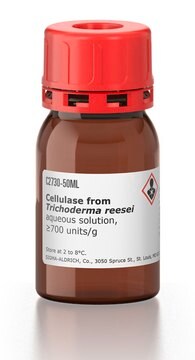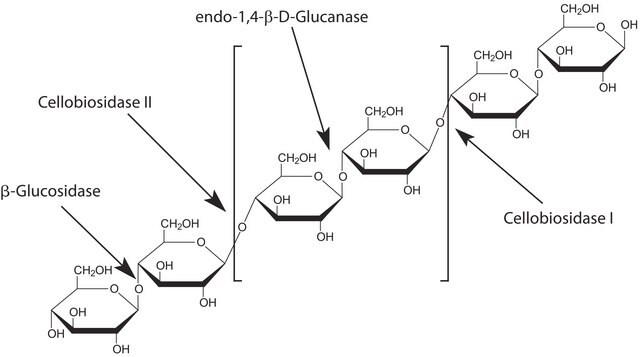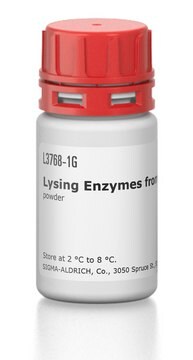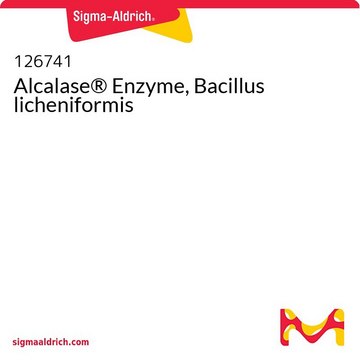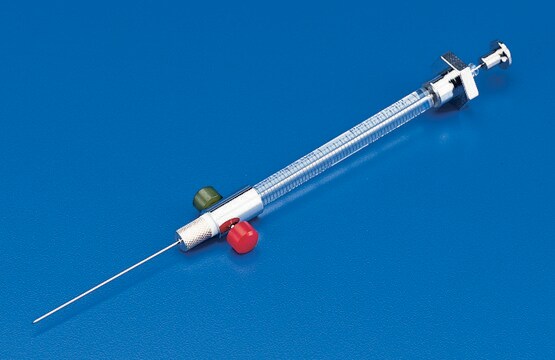V2010
Viscozyme® L
cellulolytic enzyme mixture
Sinónimos:
Cell Wall Degrading Enzyme Complex from Aspergillus sp., Lysing Enzyme from Aspergillus sp.
Iniciar sesiónpara Ver la Fijación de precios por contrato y de la organización
About This Item
Productos recomendados
biological source
fermentation/recombinant
Quality Level
form
liquid
enzyme activity
≥100 FBGU/g
technique(s)
protein extraction: suitable
density
~1.2 g/mL at 25 °C (lit.)
suitability
suitable for cell lysis
application(s)
cell analysis
storage temp.
2-8°C
General description
Viscozyme® L is a lignocellulose-specialized multi-enzymatic complex derived from Aspergillus aculeatus. It contains a wide range of carbohydrases, including arabanase, cellulase, β-glucanase, hemicellulase, and xylanase.
Application
Viscozyme® L has been used:
- in the extraction of polyphenol from grapefruit and unripe apples.
- to study the effect of its supplementation on nutritive value and silage characteristics of sunflower silage.
- for simulation of the fermentation process during in vitro digestibility of former food products (FFPs).
- for enzymatic treatment, to study its effects on the antioxidant properties of wheat bran.
Biochem/physiol Actions
Viscozyme L aids in the release of oil bodies and proteins from cells by degrading the hemicellulose, cellulose, and pectin molecules, and by breaking the cell wall components.
Features and Benefits
- Not a GMO and doesn′t contain GMOs.
- Made by fermentation of a microorganism.
- Improves process through faster, more efficient oil/water separation.
Legal Information
A product of Novozyme Corp.
Viscozyme is a registered trademark of Novozymes Corp.
signalword
Danger
hcodes
pcodes
Hazard Classifications
Resp. Sens. 1
Storage Class
10 - Combustible liquids
wgk_germany
WGK 1
flash_point_f
Not applicable
flash_point_c
Not applicable
ppe
Eyeshields, Gloves, multi-purpose combination respirator cartridge (US)
Elija entre una de las versiones más recientes:
¿Ya tiene este producto?
Encuentre la documentación para los productos que ha comprado recientemente en la Biblioteca de documentos.
Los clientes también vieron
Estelle Couradeau et al.
PloS one, 6(12), e28767-e28767 (2011-12-24)
The geomicrobiology of crater lake microbialites remains largely unknown despite their evolutionary interest due to their resemblance to some Archaean analogs in the dominance of in situ carbonate precipitation over accretion. Here, we studied the diversity of archaea, bacteria and
Barbara M Auinger et al.
Applied and environmental microbiology, 74(8), 2505-2510 (2008-02-26)
Here we introduce a method for quantitative analysis of planktonic protists and microalgae from preserved field samples combining morphological and small-subunit (SSU) rRNA gene sequence analysis. We linked a microscopic screening with PCR of single cells using field samples preserved
Enhancing polyphenol extraction from unripe apples by carbohydrate-hydrolyzing enzymes.
Zheng, H.
Journal of Zhejiang University. Science, 10, 912-919 (2009)
Suvi T Häkkinen et al.
Frontiers in plant science, 6, 1035-1035 (2015-12-05)
Bioconversion, i.e., the use of biological systems to perform chemical changes in synthetic or natural compounds in mild conditions, is an attractive tool for the production of novel active or high-value compounds. Plant cells exhibit a vast biochemical potential, being
Paul Bikker et al.
Journal of applied phycology, 28(6), 3511-3525 (2016-12-31)
The growing world population demands an increase in animal protein production. Seaweed may be a valuable source of protein for animal feed. However, a biorefinery approach aimed at cascading valorisation of both protein and non-protein seaweed constituents is required to
Nuestro equipo de científicos tiene experiencia en todas las áreas de investigación: Ciencias de la vida, Ciencia de los materiales, Síntesis química, Cromatografía, Analítica y muchas otras.
Póngase en contacto con el Servicio técnico